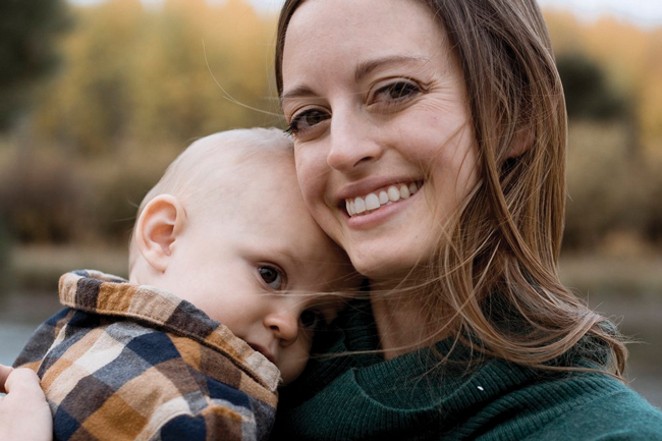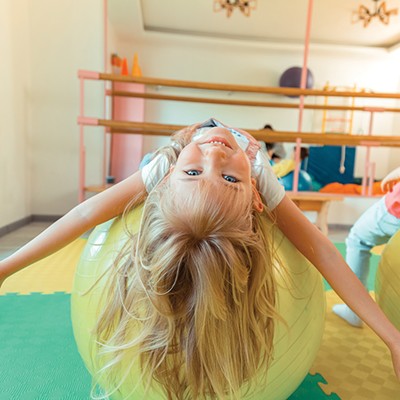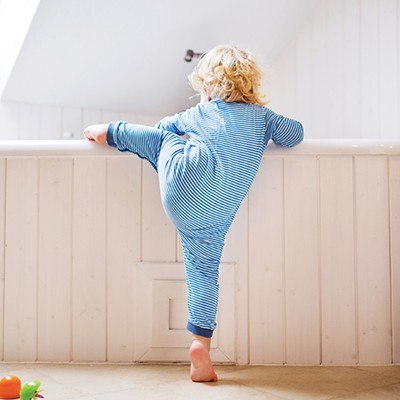As we approach the second anniversary of the pandemic, parents of children born during this unique time may have questions about their child’s social and emotional development.
Questions like: How has social distancing affected my infant? Has my baby received enough human contact to recognize facial emotions? Will my toddler’s speech and language development be delayed? Will they know how to share, care and play cooperatively when they’ve missed out on preschool, play dates and birthday parties?
For local parents like Dr. Jessica Goyke, a chiropractor and mother of 14-month-old Rory, this issue is top of mind.
“We were happy to find out we were pregnant in early March of 2020 with our first son,” says Goyke. “When the pandemic began, my first concern was missing the opportunities to connect with other pregnant moms in prenatal yoga classes or birthing prep. The reality of this really hit me when Rory was born and we didn’t have the opportunities I dreamed of for him growing, developing and thriving. I wondered how this might affect him physically, mentally and emotionally.”
These are valid questions. We know that young children experience explosive brain growth early on that lays the foundation for critical cognitive, emotional and social skills. Ample research in pediatric cognitive science supports the vital importance of this time for later health, development and well-being.
According to the nonprofit organization Zero to Three, “A child’s brain undergoes an amazing period of development from birth to age three—producing more than a million neural connections each second. The development of the brain is influenced by many factors, including a child’s relationships, experiences and environment.”
So, what happens when a global pandemic and widespread economic shutdowns interrupt this developmental window of opportunity for brain growth?
The bad news first, without sugarcoating it: An alarming U.S. study on child neurodevelopment claims that children born during the Covid-19 pandemic have a shocking 22-point lower IQ than babies born before the pandemic, with effects especially pronounced for male children and those from lower socio-economic backgrounds (Impact of the COVID-19 Pandemic on Early Child Cognitive Development: Initial Findings in a Longitudinal Observational Study of Child Health).
This large, on-going longitudinal study at Brown University assessed approximately 700 healthy children aged between three months and three years on key metrics, including babbling, crawling and rolling over in babies' and fine and gross motor control, visual reception and expressive language for toddlers using the Mullen Scales of Early Learning system, which converts these metrics into IQ scores. According to the results, participating children displayed significantly reduced verbal, motor and overall cognitive performance compared to their pre-pandemic-born peers.
Researchers theorize that the combination of face masking, quarantining and other social distancing measures, school and playground closures and other policies meant to slow the spread of COVID-19 have contributed to these adverse effects.
“While there is no past analogue or example of non-conflict related wide-spread and prolonged lock-downs from which to draw information, concern for child development stemmed principally from the known impact that family and home stress, parent and child anxiety, lack of stimulating environments and other economic and environmental adversities can have on the developing infant and child brain,” says the study.
Next, the good news: children are resilient. If the main reason for the falling cognitive test scores is a lack of stimulation at home and less social interaction outside, then the way to counteract this impact is to provide more quality contact time and responsive stimulation. This is something every parent can give their child for free—no money, fancy toys or specialty toddler classes required.
“Children are incredible at informing us of their needs; they find ways to play even when there are no toys and they communicate until they get what they need, even before they speak words,” says Goyke. “Through all of this I’ve reminded myself that a child’s main need is an attentive, present, loving caregiver. This may not be the start we imagined for our children, but we can still provide an optimal foundation by being attentive parents.”
Of course, there is no denying that, while we love our children beyond measure, our attention may be in short supply these days given the demands of working in-person or from home, economic hardship and increased stress. Fortunately, more employers are recognizing the dual demands of childrearing and work and are giving employees a break when it comes to interrupting a conference call to attend to a crying child.
“Children are incredible at informing us of their needs; they find ways to play even when there are no toys and they communicate until they get what they need, even before they speak words.” - Dr. Jessica Goyke
tweet this
“I’ve adapted my work schedule to be more present with my son,” says Goyke. “It feels important for me to be a primary caretaker during these uncertain times.”
In addition, there are other resources to support parenting. Zero to Three has some helpful guides for families on topics such as self-care, age-appropriate responses to common questions and activities for young children experiencing social distancing. Connecting with other parents of young children in similar situations (either online or in real life) can also reduce isolation.
The key to providing a stimulating, varied and responsive environment is to focus on the many daily opportunities for playful social interactions between young children and their caregivers. Simple, no-cost activities centered around talking, singing, dancing, laughing, reading and playing will help little ones not just survive, but thrive.
“These times have taught me just how vital it is to be intentional with my energy and time,” says Goyke. “I really want to be present and have energy for my son because I can see how powerfully that pours into his development.”
Simple Exercises
To promote healthy connection and development in infants and toddlers- Sing in the car on your way to the grocery store with your young one in tow.
- Read the food labels aloud as you shop and talk to your baby about what’s on the menu.
- When cooking, turn on the music and dance around the kitchen as your toddler twirls beside you.
- After dinner, make a game out of washing the dishes—what young child doesn’t love a big bucket of soapy water?
- Commit to one more bedtime story (even if it’s a quick one while changing into pajamas).
- Turn out the light knowing you are an amazing parent doing an extraordinary job in extraordinary times.To quote The Beatles, “All you need is love…”























